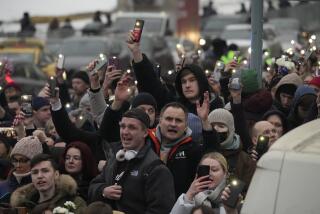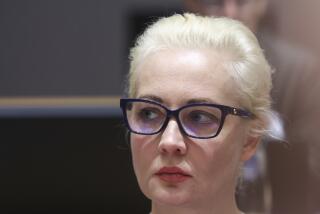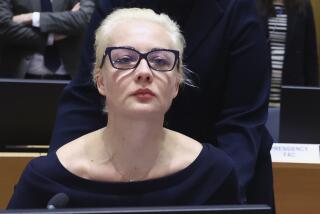Mrs. Yeltsin Offers Russians Reassurances
- Share via
MOSCOW — Since Boris N. Yeltsin was rushed to the hospital last week with a new bout of heart disease, Russia has been gripped by speculation that its unpopular president is near death and that his post-Soviet reforms may be swept away in an imminent--and possibly bloody--change of leadership.
Naina I. Yeltsin endured all that silently, with pain in her own heart--until Tuesday. Then she vented her feelings in a televised interview aimed at assuring the world that her husband is on the mend and urging Russians to bear their own hardships in the name of his democratic, free-market course.
“We are all from the past,” the Russian First Lady said. “It is very difficult to change everything overnight. We should not demand the impossible of the president now. . . . We must help the president overcome.”
The 24-minute interview, aired partly on Russian Television, was extraordinary. It thrust the matronly Mrs. Yeltsin, an intensely private person, into a public role as presidential spokeswoman, eclipsing powerful Kremlin aides who have lost much of their credibility.
It was also unusual that instead of limiting her remarks to her 64-year-old husband’s health, she plunged into Russia’s political fray, much as Soviet President Mikhail S. Gorbachev’s glamorous and opinionated wife, Raisa, did in the heady days of perestroika .
Wearing a conservative blue suit and speaking in measured tones, Mrs. Yeltsin, 63, denounced Communists and hard-line nationalists who are favored to win the Dec. 17 parliamentary elections as a “black opposition” bent on wrecking the country.
She defended Russia’s “evolution” toward free-market capitalism and rejected assertions that only a tiny minority is benefiting.
“We shouldn’t paint all this in dark colors,” she declared. “The shops are full. Russia is building up. If you travel by plane, you can see construction under way. If people are building houses, it is a sign the country is surviving. It is too early to bury Russia.”
Mrs. Yeltsin said last spring that she wants her husband to retire when his term expires next June so that he can rest.
She did not speak on that subject Tuesday, but she admitted her inability to rein in his self-destructive habits.
“Sadly, I cannot demand anything of him,” she said. “He is very careless about his health. He has always been so.
“Boris Nikolayevich is such a person who takes all his work to heart,” she added. “I told him long ago, you cannot be a leader, because a leader must be indifferent. . . . So much worrying falls on the heart of any leader. It is very painful to watch this. It is not his heart alone that is in pain.”
She said Yeltsin failed to complete prescribed treatment for his earlier heart ailment, in July.
He spent two weeks in a hospital and two weeks at a country retreat but “started having serious meetings” with aides a week after he was stricken, she said.
The First Lady attributed her husband’s relapse to a demanding, self-imposed schedule during official visits last month to France and the United States, aggravated by jet lag.
He was stricken Thursday, two days after returning home from New York.
Doctors have described both episodes as bouts of ischemia, which reduced the supply of blood and oxygen to Yeltsin’s heart, and avoided the Russian word infarkt , which means heart attack. They have joined Mrs. Yeltsin in insisting that the president get more rest this time--three weeks in the hospital and two weeks of vacation.
Mrs. Yeltsin’s interview appeared to be part of a coordinated effort to dispel any impression that the president is near death.
Prime Minister Viktor S. Chernomyrdin and Kremlin spokesman Sergei K. Medvedev, among others, had been asserting that Yeltsin was in control of the country, but they lacked credibility because they had not been allowed into the hospital.
On Tuesday, Mrs. Yeltsin and two of the few other people who have seen the president--the head of his eight-member medical team and his chief of security--stepped forward with upbeat reports on his health.
“I can say with relief that his condition is improving,” Mrs. Yeltsin said, looking a bit tired but not on edge. “Of course we are all worried . . . but I think it’s simply out of place to speak about the president’s incapacity.”
Her televised appearance put many Russians more at ease.
“Frankly, I don’t like Yeltsin,” said Margarita D. Bessonova, 38, a Moscow housewife. “But I am afraid a lot of bad things may happen to this country again if he dies now. Naina’s interview is reassuring. It is impossible that she would talk to the cameras and smile like that if her husband is fighting for his life.”
In the first public statement by any doctor treating the president’s heart, Dr. Andrei Vorobyov, Yeltsin’s chief physician, reported that his ischemia had caused “no changes in his heart that could threaten his ability to work” after a complete recovery.
He said the president’s electrocardiogram, blood pressure and temperature are normal.
Mrs. Yeltsin and Kremlin security chief Alexander V. Korzhakov said the president is already reading documents, signing orders, scheduling meetings with aides and chafing at doctors’ instructions to stay in bed until the end of this week.
More to Read
Sign up for Essential California
The most important California stories and recommendations in your inbox every morning.
You may occasionally receive promotional content from the Los Angeles Times.













